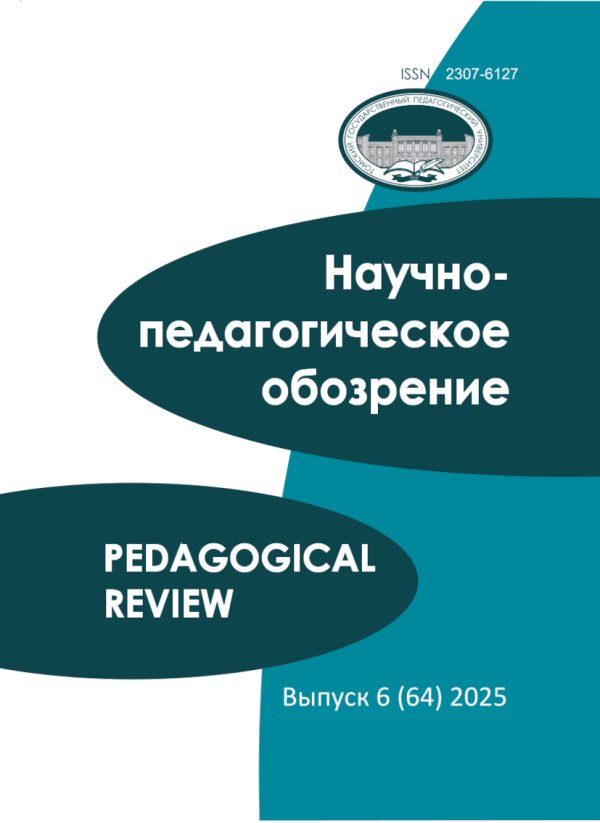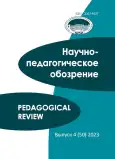Диалоговый тренажер как средство формирующего оценивания
- Авторы: Ледовская Т.В.1, Морозов А.С.1, Солынин Н.Э.1
-
Учреждения:
- Ярославский государственный педагогический университет им. К. Д. Ушинского
- Выпуск: № 4 (2023)
- Страницы: 141-152
- Раздел: ПСИХОЛОГИЯ
- URL: https://journal-vniispk.ru/2307-6127/article/view/270039
- DOI: https://doi.org/10.23951/2307-6127-2023-4-141-152
- ID: 270039
Цитировать
Полный текст
Аннотация
Об авторах
Татьяна Витальевна Ледовская
Ярославский государственный педагогический университет им. К. Д. Ушинского
Email: karmennnn@yandex.ru
кандидат психологических наук, доцент ул. Республиканская 180/1, Ярославль, 150000
Андрей Сергеевич Морозов
Ярославский государственный педагогический университет им. К. Д. Ушинского
Email: andreimorozov.yspu@gmail.com
руководитель лаборатории Ярославль, Россия
Никита Эдуардович Солынин
Ярославский государственный педагогический университет им. К. Д. Ушинского
Email: sonik7-39@yandex.ru
кандидат психологических наук, доцент Ярославль, Россия
Список литературы
- Ценности педагогического образования: история и современное состояние / Л. Н. Данилова, Т. В. Ледовская, Д. С. Молоков и др.; под науч. ред. А. М. Ходырева. Ярославль: Ярославский гос. пед. ун-т им. К. Д. Ушинского, 2020. 175 с.
- Ходырев А. М. Проблема изучения ценностей педагогической деятельности // Ярославский пед. вестник. 2020. № 2 (113). С. 34–40.
- Харисова И. Г., Макеева Т. В., Казакова Е. И., Тарханова И. Ю. Выявление ценностно-смысловых ориентиров профессиональной педагогической деятельности с позиции социально-профессиональной общности современного учительства // Science for Education Today. 2021. Т. 11, № 5. С. 7–26.
- Brún A. De, Rogers L., Drury A. Gilmore, B. Evaluation of a formative peer assessment in research methods teaching using an online platform: A mixed methods pre-post study // Nurse Education Today. 2022. Vol. 108. Р. 105166.
- Koh L. C. Academic staff perspectives of formative assessment in nurse education // Nurse Education in Practice. 2010. Vol. 10, Iss. 4. P. 205–209.
- Otto H. E., Mandorli F. Advancing formative assessment in MCAD education: The visual analytics of parametric feature-based solid models // Advanced Engineering Informatics. 2021. Vol. 48. Р. 101308.
- Pla-Campas G., Arumí-Prat J., Senye-Mir A. M., Ramírez E. Effect of Using Formative Assessment Techniques on Students’ Grades // Procedia – Social and Behavioral Sciences. 2016. Vol. 228. P. 190–195.
- Gulikers J. T. M., Biemans H. J. A., Wesselink R., van der Wel M. Aligning formative and summative assessments: A collaborative action research challenging teacher conceptions // Studies in Educational Evaluation. 2013. Vol. 39, Iss. 2. P. 116–124.
- Gikandi J. W., Morrow D., Davis N. E. Online formative assessment in higher education: A review of the literature // Computers & Education. 2011. Vol. 57, Iss. 4. P. 2333–2351.
- Yan Z., Chiu M. M., Cheng E. C. K. Predicting teachers’ formative assessment practices: Teacher personal and contextual factors. // Teaching and Teacher Education. 2022. Vol. 114. Р. 103718.
- Yang A. C. M., Flanagan B., Ogata H. Adaptive formative assessment system based on computerized adaptive testing and the learning memory cycle for personalized learning // Computers and Education: Artificial Intelligence. 2022. Vol. 3.
- Veugen M. J., Gulikers J. T. M., den Brok P. We agree on what we see: Teacher and student perceptions of formative assessment practice // Studies in Educational Evaluation. 2021. Vol. 70. Р. 101027.
- Sullivan P., McBrayer J. S., Miller S., Fallon K. An Examination of the use of computer-based formative assessments // Computers & Education. 2021. Vol. 173. P. 178–202.
- Say R., Visentin D., Cummings E., Carr A., King C. Formative online multiple-choice tests in nurse education: An integrative review // Nurse Education in Practice. 2022. Vol. 58. Р. 103262.
- Hansen G. Formative assessment as a collaborative act. Teachers` intention and students` experience: Two sides of the same coin, or? // Studies in Educational Evaluation. 2020. Vol. 66. Р. 100904.
- Zainuddin Z., Shujahat M., Haruna H., Chu S. K.W. The role of gamified e-quizzes on student learning and engagement: An interactive gamification solution for a formative assessment system // Computers & Education. 2020. Vol. 145. Р. 103729.
- Лебедева Т. Н. Диалоговые тренажеры в образовании // Актуальные проблемы развития общего и высшего образования: XVIII межвузовский сб. науч. тр. Челябинск: Край Ра, 2022. С. 232–239.
- Кочубей А. В., Кочубей В. В. Эффективность компьютерного диалогового тренажера в образовательном процессе организаторов здравоохранения // Виртуальные технологии в медицине. 2017. № 1 (17). С. 46–47.
- Артюхина М. С. Особенности современных средств обучения в контексте интерактивных технологий // Вестник Российского ун-та дружбы народов. Серия: Информатизация образования. 2014. № 2. С. 76–81.
- Molin F., Bruin A. de, Haelermans C. A conceptual framework to understand learning through formative assessments with student response systems: The role of prompts and diagnostic cues // Social Sciences & Humanities Open. 2022. Vol. 6, Iss. 1.
Дополнительные файлы







